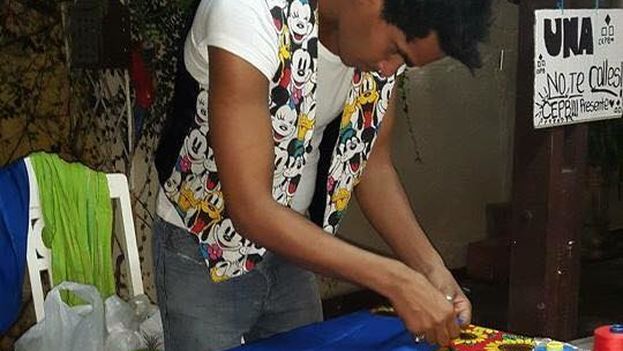
![]() 14ymedio, Havana, 12 October 2017 — In a note published on its website and distributed through institutional emails, the Union of Writers and Artists of Cuba (UNEAC) warns its members that “some unscrupulous people” are organizing an independent Biennial after the postponement of event originally planned for 2018.
14ymedio, Havana, 12 October 2017 — In a note published on its website and distributed through institutional emails, the Union of Writers and Artists of Cuba (UNEAC) warns its members that “some unscrupulous people” are organizing an independent Biennial after the postponement of event originally planned for 2018.
The XIII Havana Biennial was postponed to 2019 due to “the very serious damage caused by Hurricane Irma to the country’s system of cultural institutions ” according to a declaration of the National Council of Plastic Arts published at the end of September and also initialed by the Wilfredo Lam Center for Contemporary Art.
Several young artists, who are not in agreement with the postponement, have decided to go ahead with the organization of an independent event called the Havana Biennial 2018. The artist Luis Manuel Otero Alcántara is one of the most visible faces of this initiative.
Otero Alcántara commented to 14ymedio that they have “the support of several artists and independent galleries” to carry out the exhibitions and workshops. The young man believes the official artists union is annoyed because “it it an interesting and decisive moment” to hold the independent Biennial. “Strong energy has been generated” around the idea and “the majority of those consulted support it,” he says.
In the response note circulated by the UNEAC, the executive of the Association of Plastic Artists points out that the organizers of the independent proposal “can not divide us” and that the members of the official organization understand and support the decision to postpone the Biennial.
“We strongly support Raul’s call to our people,” concludes the statement, which stresses that “we will go forward in all fields, despite cyclones and blockades.”
The artist Leonardo Salgado, harshly criticized the declaration of the official organization and described as “opportunist” the intention to blame the cancellation of the XIII Havana Biennial on Hurricane Irma.
Salgado points out that “the obsolete, obsessive and unsustainable” will of the Cuban government to “organize and direct all political, economic and social activities” is what has plunged the country into stagnation and proposes that the government allow the Independent Biennial, at least to raise funds.
“Why does UNEAC not defend and embody the interests of the artists it represents in front of a government that only prioritizes political, economic and social immobility?” the artist asks in a chain of responses to the official communication.
“If expressing freely what we think is called provocation, how can we dialogue? If the institutions that represent us call us unscrupulous for asking for the floor, through whom do we do it?”
The last edition of the Havana Biennial was held between May and June 2015 and had as its theme “Between idea and experience.” In its three decades of life, the artistic event has gone through different stages; at some points creative effervescence prevailed but at others the strongest influences were the nefarious effects of economic crisis and censorship.
